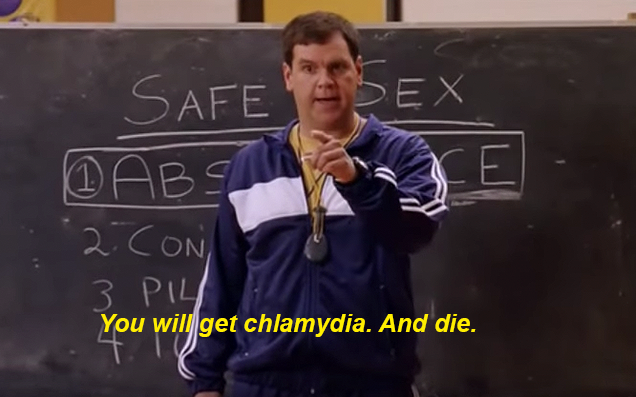
As the great Coach Carr once said, “At your age, you’re going to have a lot of urges. You’re going to want to take off your clothes, and touch each other. But if you do touch each other, you will get Chlamydia – and die.”

But this got me thinking – could you actually cop Chlamiddy and cark it? Like, if you left it untreated for years? Well, I felt it was my civil duty to find out, because I’d like to prevent sex-havers from having “Death by Chlamydia” on their tombstones where possible.
We called upon a pro – Head of Stigma Health, Dr Tanner – to get an answer once and for all.
What even is Chlamydia?
“Chlamydia is the name given to the infection caused by the bacteria (microorganism) Chlamydia trachamotis,” Dr Tanner explained.
For those with a female reproductive system? This bacteria can infect the lower genital tract (the urethra – aka the tube that runs from the bladder to the uh, dunny) and lower part of the vag, including the cervix. It can also affect the upper genital tract – the uterus + fallopian tubes.
For males? It can affect your prostate and testes.

“It can also infect the throat, rectum, and conjunctival (eye) mucosa. The bacteria should not be in these locations. When it is, it causes inflammation and other changes, which leads to the long term problems caused by Chlamydia.”
Sweet hell. Do not want that all up in my anatomy.
How do you cop Chlamydia?
You contract Chlamydia through sexual fluids (semen, blood or vaginal fluids) during unprotected vaginal, anal or oral sex. Tanner told me there is literally no other way to “catch it”. If your partner has gotten Chlamydia after you’ve been tested? They are absolutely cheating on you. Sorry. And no, you can’t get it off the toilet seat, no matter how germ-infested that thing may look. You’ve been living a lie.

Can this STI get worse if left undiagnosed / untreated? Short answer: absolutely. Having one STI in general means you’re more at risk of contracting another.
“This is due to both the risk associated with sexual behaviours, but also because having a genital tract that is infected means it is more susceptible to contracting another infection if the person is exposed,” Tanner explained.
“This is particularly pertinent to HIV exposure and risk of contraction if exposed. It is well documented that a person’s chance of contracting HIV when exposed is much higher if they already have an STI including Chlamydia.”
This is why it’s so damn important to get tested. Even if you’re not experiencing symptoms, like abnormal discharge from your peen or vaginé, you could very well still have Chlamydia and need to treat it to prevent further issues.

Wait, so what are the symptoms?
Women:
- abnormal vaginal discharge
- a burning sensation when weeing
- pain / discomfort during sexy time
- bleeding / spotting between periods or bleeding after sex
- lower abdominal pain
Men:
- penis discharge
- discomfort when urinating
- swollen and sore testes
BUT YOU MIGHT NOT EVEN EXPERIENCE ANY OF THE ABOVE AND STILL HAVE CHLAMYDIA. I REPEAT: YOU MAY BE ASYMPTOMATIC.
How do you… NOT cop Chlamydia?
Abstinence, duh. Jokes! Of course sex is great and you should engage in the hanky panky if you so desire. But wear protection. Frangas, dommies, whatever you wanna call ’em, just bloody wear ’em. Otherwise, try out the monogamous relationship thing. I know! Crazy! Of course, this only works if you’ve been tested before coitus and trust your partner enough to not be smanging others. (Yeah, come to think of it, you really should just wear those condoms.)
What’s some bad shit that can happen if you have Chlamydia?
Pelvic Inflammatory Disease: “Chlamydia can, and often does lead to Pelvic Inflammatory Disease (PID) in women,” Tanner told me. He also mentioned that while PID is common, it’s often under-appreciated by docs and can go undiagnosed. Fabulous. This is a bit (a lot) shit, because PID has the potential to lead to other long-term complications.
Like wot tho? PID can lead to “scarring and changes in the upper genital tract” which, in turn, “can cause infertility, ectopic pregnancy and chronic pelvic pain“.
Epididymo-orchitis: What in god’s name is epididymo-orchitis? Tanner told me it’s an infection of the testes which can lead to infertility, and chronic inflammation of the prostate.
Fitz-Hugh-Curtis syndrome: Sounds a bit hectic, and look, it really is. “In both sexes Chlamydia can cause a unique form for pre-hepatitis called Fitz-Hugh-Curtis syndrome, which whilst rare is very serious.”
Newborn problems: If a mother has Chlamydia during pregnancy and birth, she could pass the infection onto the newborn. The baby may get conjunctivitis (eye infection) or pneumonia (serious lung infection).
Now for the big reveal: can Chlamydia ever result in death?
Yes and no, according to Tanner.
If it remains in the lower genital tract? Absolutely not. No funerals happening here.
But the complications of Chlamydia can lead to death, I’m sorry. Coach Carr wasn’t wrong, but I can understand the doubt considering his cooked behaviour.

Chlamydia can lead to PID. PID can lead to ectopic pregnancy (growing a baby inside the fallopian tubes). Ectopic pregnancy can lead to death. How? Through a rupture than can cause severe hermorrhage. “It is probably the most serious complication of Chlamydia,” said Tanner.
It’s important to note, however, that women can experience an ectopic pregnancy without Chlamydia.
“It’s estimated that untreated Chlamydia infections increase the risk of PID from 6.5 to 25 fold (according to the Australian Government Department of Health, Third National Sexually Transmissible Infections Strategy, 2014-2017, Commonwealth of Australia 2014) and just one episode of PID increases the risk of ectopic pregnancy sevenfold (according to Better Health Victoria).“
“The better question is, is there anything ladies can do to minimise the risk of ectopic pregnancy? The answer is get tested and treated for Chlamydia and PID to prevent scarring and lower the risk.”
What would you tell someone who’s sexually active and hasn’t been tested for Chlamydia?
“Get tested and get tested now, and continue to get tested every time you change sexual partners,” Tanner asserts, noting that it’s a simple urine test. And don’t stress if you’ve got the big C. “All you have to do is take one dose of an antibiotic, once, that’s it! So it’s really not worth the risk.”
You’re also going to have to tell all your previous partners – sure, it’s a tad awkward, but after reading the above do you really want them to suffer? Surely not. Send them an anon text. Did we mention that you could face criminal charges if you knowingly transmit an STI to another human? You will also face the fact that you’re an asshole. Even if you’ve only had sex with one person, you still need to get tested mate – don’t believe the mythical grapevine.
“To get tested, people can go to their GP, a sexual health clinic, or visit stigmahealth.com to get tested online.”
And if you don’t hit up your GP?

Make sure you have health cover for the unexpected. Check out Medibank’s Healthy Start Extras cover to learn more.



